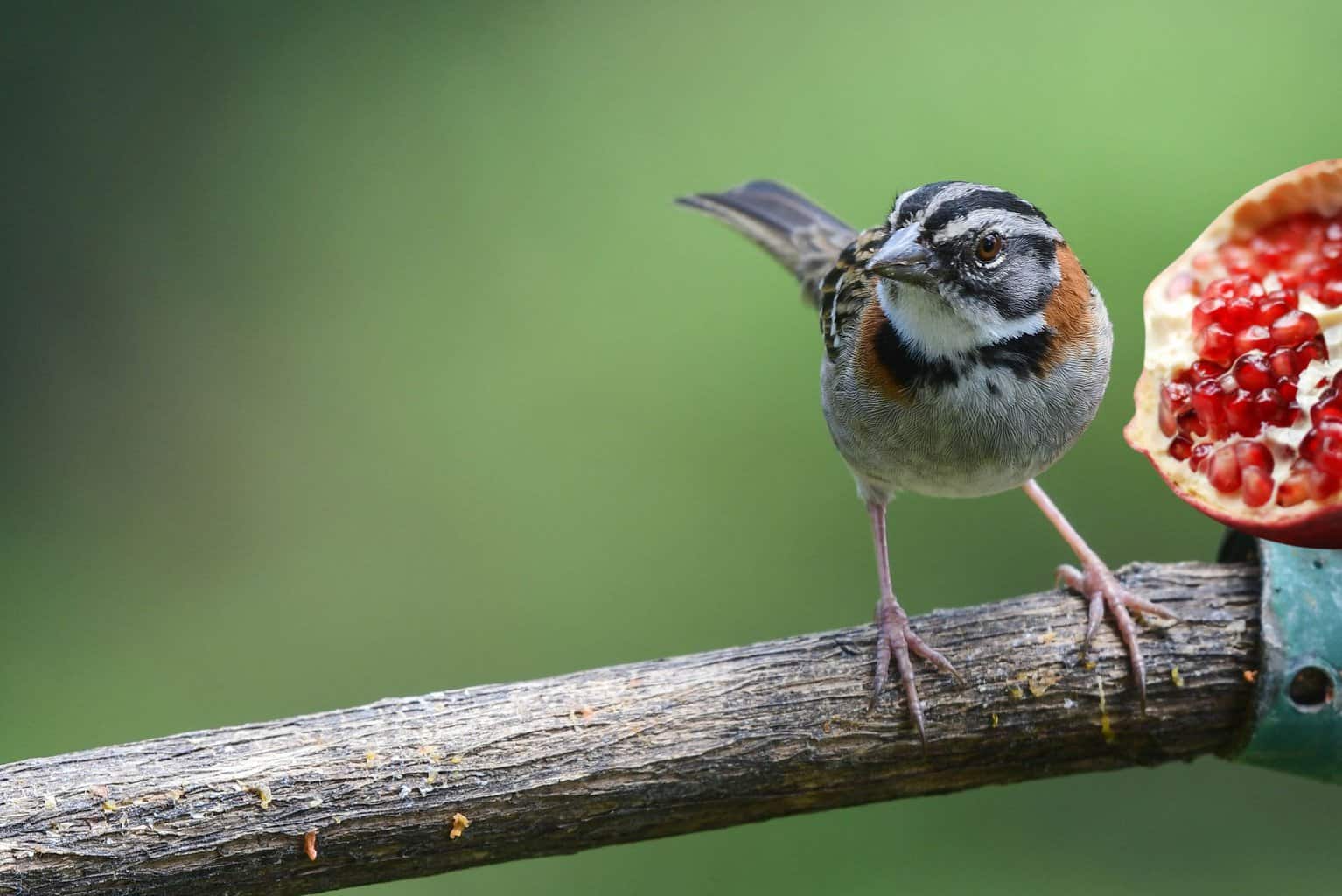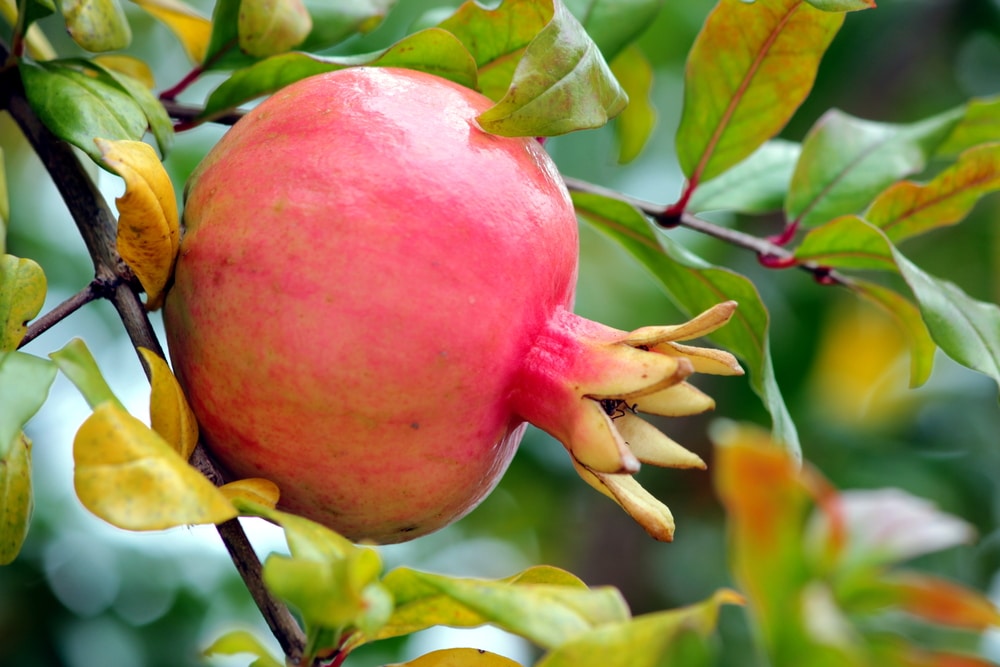Can Birds Have Pomegranate - Exploring Safe Fruit Options
Ensuring a wholesome and diverse diet is paramount to the well-being of our feathered companions. Among the array of fruits available, the question often arises: can birds have pomegranate?
Author:Maya ReyesReviewer:Sophia HarperNov 29, 202310.1K Shares195.6K Views

Ensuring a wholesome and diverse diet is paramount to the well-being of our feathered companions. Among the array of fruits available, the question often arises: can birds have pomegranate? As caregivers, understanding the safety and nutritional aspects of introducing new fruits into a bird's diet is crucial. In this exploration, we delve into the world of pomegranates and their suitability for our avian friends, uncovering safe fruit options that contribute to the overall health and joy of our feathered companions.
Types Of Pomegranate Products
- Pomegranate Seeds: Pomegranate seeds serve as a delightful and nutritious treat for birds. Rich in antioxidants, vitamins, and dietary fiber, these seeds contribute to a bird's overall health. Sprinkling a few seeds on top of their regular feed or offering them as a standalone snack provides not only a burst of flavor but also essential nutrients.
- Pomegranate Arils: Extracted from the seeds, pomegranate arils offer a juicy and visually appealing addition to a bird's diet. Birds can enjoy the arils fresh or mixed into their favorite foods. Incorporating these vibrant sacs into their diet not only adds variety but also introduces a natural source of hydration and essential nutrients.
- Pomegranate Juice: While offering pure pomegranate juice to birds should be done sparingly due to its concentrated sugar content, diluting it with water can create a refreshing and hydrating beverage. This diluted juice can be offered as an occasional treat or frozen into ice cubes for a cooling summertime snack.
- Pomegranate Peel: Dried and ground pomegranate peel can be sprinkled onto a bird's food as a flavor enhancer. While the peel might not be as commonly consumed by birds, some avian species may show interest in this addition. As with any new dietary element, it's important to monitor the bird's reaction and offer the peel in moderation.
- Pomegranate Extracts: Pomegranate extracts, if safe for avian consumption and approved by a veterinarian, can be added to a bird's diet in controlled amounts. These extracts may provide concentrated doses of antioxidants and other beneficial compounds. However, caution should be exercised, and professional advice sought to ensure the extract's suitability for the specific bird species.
Do Birds Eat Pomegranate Fruit?
Despite not being a native fruit to the United States, pomegranates (Punica granatum) can still attract the interest of wild birds if they come across this unfamiliar food source in backyard settings. While it's not a natural part of their diet, many birds, both wild and domesticated, exhibit a willingness to consume pomegranate when presented with the opportunity.
Originally native to South-Eastern Europe, East Asia, and the Himalayas, pomegranates have found a home in warmer climates, including USDA zones 8-12 in the United States. Their adaptability to hot and arid conditions, thanks to deep roots and moderate drought tolerance, makes them valuable in regions with lower water availability.
Cultivated in gardens, either as stand-alone trees or in fruiting hedgerows, pomegranates serve multiple purposes. Their deep-rooted nature aids in stabilizing slopes and preventing soil erosion. While not traditionally recognized as a significant food source for wild birds in garden settings, the fruit can still be a delightful treat for backyard birds when intentionally provided in feeding areas.
This unique aspect of pomegranates adds to their appeal, not only as a nutritious component of pet bird diets but also as an occasional delight for various wild bird species, showcasing the versatile role this exotic fruit can play in different ecosystems.
Do Birds Eat Pomegranate Seeds?
Certainly, if you're acquainted with pomegranates, you're aware that the fruit's flesh is packed with numerous seeds. The question arises: are these seeds safe for birds? The reassuring answer is yes - pomegranate seeds are entirely safe for both wild and pet birds to consume.
It's worth noting that some birds incorporate fruit as a significant part of their diet, while others may indulge in fruit only on occasion. Birds that typically consume seeds and those with omnivorous diets often enjoy fruits like pomegranates, relishing both the seeds and the surrounding flesh.
The soft texture of fresh pomegranate seeds makes them easily consumable for a diverse array of birds, including those that may find harder, tougher seeds challenging. This quality enhances the accessibility of pomegranate seeds as a delightful and safe treat for our feathered friends.
Nutrient Content Of Pomegranate
Pomegranate, scientifically known as Punica granatum, is a nutrient-dense fruit that offers a plethora of essential vitamins and minerals. The jewel-like seeds, known as arils, are the edible part of the fruit and are packed with goodness. Among the notable nutrients found in pomegranate are:
- Vitamin C: Pomegranates are rich in vitamin C, a potent antioxidant that supports the immune system and helps birds combat infections. This vitamin also plays a crucial role in collagen formation, contributing to the health of a bird's skin and feathers.
- Vitamin K: Vitamin K is essential for blood clotting and bone health. Pomegranates provide a notable amount of vitamin K, contributing to the overall well-being of birds and their skeletal system.
- Dietary Fiber: Pomegranates are a good source of dietary fiber, promoting digestive health in birds. Fiber aids in regulating bowel movements and preventing issues like constipation.
- Antioxidants: The vibrant red hue of pomegranate is indicative of its rich antioxidant content, including polyphenols and anthocyanins. These antioxidants help neutralize free radicals, protecting the cells from oxidative stress.
Health Benefits For Birds
- Immune System Support: The high vitamin C content in pomegranates supports a bird's immune system, helping them fend off illnesses and stay healthy. Regular consumption can contribute to overall disease resistance.
- Feather and Skin Health: The combination of vitamins C and K in pomegranates promotes healthy skin and feathers in birds. These nutrients play a crucial role in collagen production and maintenance.
- Digestive Health: The dietary fiber in pomegranates aids in digestion, preventing digestive issues like constipation. This is particularly beneficial for birds with specialized diets that may lack sufficient fiber.
- Antioxidant Protection: Antioxidants in pomegranates help protect the cells from oxidative damage. This is especially important for birds as it may contribute to their longevity and overall well-being.
- Hydration: Pomegranate arils contain a significant amount of water, contributing to a bird's hydration. Proper hydration is vital for various physiological functions, including nutrient transport and temperature regulation.
Wild Birds That Consume Pomegranates
While pomegranates are not a natural food source for birds, a variety of avian species demonstrate a penchant for these fruits. This includes birds that regularly incorporate fruit into their diets, such as bluebirds, jays, mockingbirds, orioles, robins, tanagers, thrashers, and woodpeckers.
Beyond those traditionally inclined toward fruit consumption, other birds may also partake in a fruity treat when pomegranates are provided on a bird table. This broader audience includes seed-eating species like finches and omnivores such as sparrows, cardinals, and grosbeaks.
Interestingly, numerous bird species, although not primarily fruit consumers, readily embrace pomegranates when offered, highlighting the universal appeal of this occasional and unexpected culinary delight in the avian world.
The Benefits Of Pomegranates On Wild Birds
Wild birds or backyard birds should primarily rely on natural food sources, including a mix of fruits, berries, nectar, seeds, and insects. Nonetheless, supplementing their diet with additional food, particularly during seasons with fewer natural resources, is beneficial.
Pomegranates, being a nutritious fruit, can provide essential nutrients for both birds and humans without posing any toxicity risk. Unlike some fruits with toxic seeds or pits, pomegranates are safe and can contribute vitamins and nutrients as a supplementary addition to a bird's diet.
It's important to note that fresh fruits, including pomegranates, offer valuable vitamins and plant sugars, providing birds with an energy boost. Thus, incorporating pomegranates occasionally as a supplement alongside foraged foods contributes to a well-rounded and healthy bird diet.
Pomegranates For Pet Birds
Incorporating fruits, including pomegranates, into the diet of pet birds, such as parrots, can be beneficial. The juicy flesh and seeds of this succulent fruit are usually enjoyed by pet birds, although it's important to be prepared for the potential mess they can create.
However, moderation is key when offering pomegranates or any fruit to pet birds. Fruits should constitute no more than approximately 20% of their regular diet, with the majority of their nutrition coming from a well-balanced and diverse source. Similar to humans, birds require a diet that mirrors their natural, wild counterparts for optimal health.
While pomegranates are nutritious, their natural sugars mean they should be provided in moderation to prevent potential health issues for birds. It's crucial to include protein sources, fresh leafy greens, and other components in a pet bird's diet to ensure a comprehensive and balanced nutritional intake.
Can Parrots Eat Pomegranate?
Yes, parrots can eat pomegranates. Pomegranates are generally safe and nutritious for parrots, providing them with essential vitamins and antioxidants. Parrots may enjoy both the juicy flesh and seeds of the pomegranate. However, it's important to offer pomegranate in moderation, as part of a balanced diet that includes a variety of fruits, vegetables, seeds, and pellets.
Also, make sure to remove any seeds that may be too large or pose a choking hazard. Always introduce new foods gradually to monitor how your parrot reacts and to prevent any potential digestive issues.
Feeding Pomegranates To Birds
Introducing pomegranate to a bird's diet can be a flavorful and nutritious addition, but it's essential to take certain precautions to ensure the bird's well-being. Pomegranates are packed with essential nutrients, including vitamins C and K, as well as antioxidants. These elements contribute to the overall health of birds, promoting strong immune systems and vibrant feathers.
Before offering pomegranate to birds, it's crucial to properly prepare the fruit. Start by cutting the pomegranate into small, manageable pieces, making it easier for the bird to eat. Remove the seeds from the surrounding membrane, as the seeds are the edible part of the fruit. Birds may struggle with larger seeds, so breaking them into smaller, more manageable pieces is advisable.
While pomegranate seeds are generally safe for birds, it's important to feed them in moderation. Like many fruits, pomegranates contain natural sugars, and excessive consumption can lead to weight issues and other health concerns. Offering pomegranate as an occasional treat rather than a regular part of the bird's diet is a balanced approach.
To offer pomegranates to birds, scoop out the flesh and seeds, placing a small handful on a bird table or another feeding station. Alternatively, mix them with seeds or other fruits. Since most birds can't penetrate the tough outer skins, it's necessary to open the fruits to grant access to their contents.
For those in regions suitable for growing pomegranate trees, sharing a portion of the harvest with feathered friends can be a delightful gesture.
However, it's crucial to remember that providing exotic treats is just one way to support birds. Creating a bird-friendly environment involves offering natural food sources, shelter, habitat, and water in your garden, contributing significantly to the well-being of the birds that share your space.
Safe Fruits Option For Birds
Providing safe and nutritious fruits is essential for the well-being of pet birds. Not all fruits are suitable for birds, as some may be toxic or pose choking hazards. It is crucial for bird owners to be aware of safe fruit options to ensure the health and safety of their feathered friends.
One excellent and widely accepted fruit for birds is apples. Apples are rich in vitamins and minerals, providing essential nutrients like vitamin C and dietary fiber. However, it is essential to remove the seeds and core before offering them to birds, as the seeds contain cyanide, which can be harmful.
Berries, such as blueberries, strawberries, and raspberries, are also safe and nutritious choices for birds. Packed with antioxidants, these fruits contribute to the overall health of birds and provide a flavorful treat. Before serving berries, it's advisable to wash them thoroughly to remove any pesticides or residues.
Bananas are another bird-friendly fruit that is easy to digest and rich in potassium. They can be a good source of energy for birds, but moderation is key due to their high sugar content. Offering small, bite-sized pieces ensures that birds can enjoy the treat without overindulging.
Citrus fruits, such as oranges, grapefruits, and tangerines, are generally safe for birds in moderation. While these fruits are high in vitamin C, they should be given as an occasional treat rather than a staple in their diet. Some birds may be sensitive to the acidity, so it's essential to observe individual reactions.
Papayas and mangos are tropical fruits that birds often enjoy. These fruits provide a good dose of vitamins A and C, promoting healthy feathers and skin. As with any fruit, it is essential to remove any seeds or pits to prevent potential choking hazards.
In contrast, avocados should be strictly avoided, as they contain a substance called persin, which is toxic to birds. Grapes and raisins should also be excluded from a bird's diet, as they have been associated with kidney failure in some species.
Can Birds Have Pomegranate - FAQ
What Fruits Are Safe For Birds?
Berries and small fruits, including blueberries, raspberries, currants, blackberries, mulberries, beautyberries, serviceberries, sumac, holly, juniper, and viburnum are especially popular with many birds. Birds also enjoy other fruits such as oranges, plums, apples, grapes, cherries, crabapples, and prickly pear.
Is Pomegranate Good For Animals?
Another study shows that some fruits, including pomegranates, are natural antioxidants and can be beneficial to include in dog food.
What Is Pomegranate Rich For?
Pomegranates are rich in antioxidants and polyphenolic compounds, including punicalagins, anthocyanins, and hydrolyzable tannins. Getting antioxidants from fruits such as pomegranates is a great way to support overall health and prevent disease.
Wrap Up
The question of "Can birds have pomegranate?"finds its answer in the careful consideration of both safety and nutritional benefits. Pomegranates, when introduced thoughtfully and in moderation, can be a flavorful addition to a bird's diet. By exploring safe fruit options like pomegranates, we embark on a journey of enhancing the well-being and happiness of our avian companions.
Jump to
Types Of Pomegranate Products
Do Birds Eat Pomegranate Fruit?
Do Birds Eat Pomegranate Seeds?
Nutrient Content Of Pomegranate
Health Benefits For Birds
Wild Birds That Consume Pomegranates
The Benefits Of Pomegranates On Wild Birds
Pomegranates For Pet Birds
Can Parrots Eat Pomegranate?
Feeding Pomegranates To Birds
Safe Fruits Option For Birds
Can Birds Have Pomegranate - FAQ
Wrap Up

Maya Reyes
Author
Maya Reyes’s wanderlust was sparked in the temples of Luang Prabang, where the scent of lemongrass and the chants of monks revealed the transformative power of travel.
Since then, her journey has been defined by cultural immersion and authentic connections. From learning batik in Indonesia to sharing meals with nomadic families in Mongolia, Maya seeks experiences that highlight the human stories behind each destination.
Travel for her is a way to weave her narrative into the world’s cultural tapestry, creating bridges across diverse ways of life. Maya has traveled to 15 countries and shares her insights through writing and storytelling.

Sophia Harper
Reviewer
Sophia Harper’s photography acts as a portal to the soul of the places she visits. Drawn to South America’s landscapes and cultures, she has spent years capturing everything from the majesty of ancient ruins to the vibrancy of urban streets.
Sophia’s work isn’t just about documenting moments; it’s about evoking the emotions and stories behind them. A dedicated photographer, she has worked with local communities across South America to capture their rich cultural narratives through her lens.
Latest Articles
Popular Articles

